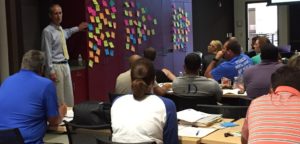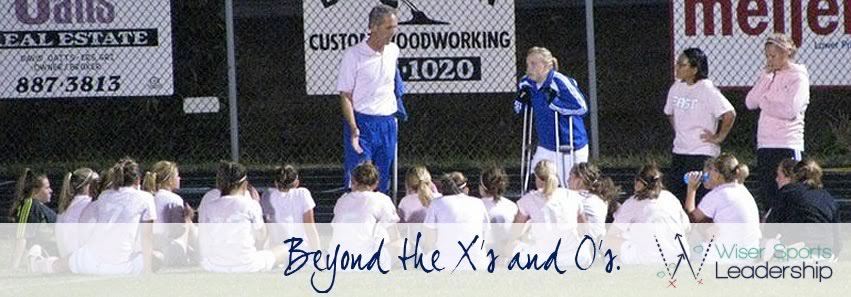TRAINING COACHES……IS IT YOU?
DeAngelo Wiser
Athletic Directors are the most overlooked and overworked component of a sports program, especially at the high school and small college level. They are expected to do everything from sweeping the floor, taking up tickets and listen to every complaint with a smile, while getting little rest to repeat the process tomorrow. With that in mind this article is directed their way. Not to add to their list, but to emphasize how important their role is in developing new or inexperienced coaches.
A lot of time and resources can be devoted to training coaches. Various accredited organizations offer diplomas and licenses that open doors for many. Clubs and schools welcome coaches who have these credentials in with open arms, but where does your training originate?
One concern athletic directors hear about a new, inexperienced coach hired before the season begins is “They don’t know enough about the game.” That may be based on a practice observed, or someone’s opinion. Quite often it’s correct, but this aspect of technical and tactical coaching is more readily solved with courses, seminars, webinars, clinics and even a veteran assistant.
What about leadership? Do you have a program within your sports department to develop and teach new coaches leadership skills? Some of the biggest challenges a coach faces are not technical or tactical aspects of the game, they’re leadership related.
Hiring a technically sound coach who is a student of the game is easily detected. However, it doesn’t always guarantee they know how to lead a team or deal properly with challenges.
 Some of the biggest challenges come from:
Some of the biggest challenges come from:
· Playing time
· Accountability
· Motivation
· Parents
· Academics
· Bringing a team together
· Handling adversity/success
· Building a program
Given a choice, would coaches rather deal with specific aspects of the game or the above mentioned? Most coaches love the game and thoroughly enjoy teaching technical and tactical areas. There is nothing more rewarding than seeing a player apply a learned skill for success in a game. But what about the leadership skills needed to lead a team? There will be days coaches are mired in mountains of psychological issues brought on by selfishness, behavior, parents, and many more. Are they equipped to handle it?
When thrown into a sea of challenges without any training, their only recourse is:
· Ask other coaches if time permits.
· Do what they feel is right at the time.
Other coaches can give them great insight from experience and offer solutions, but is the situation exactly the same? And doing what they think is right may seem like the best idea at the time, but without experience can they know all the areas impacted? Remember a well meaning and beneficial national organization can train our coaches to a certain degree, but will they be responsible if something goes wrong? We would all agree the answer is no.
Let’s think about some ways to better prepare coaches:
· Do you have a clear list of expectations for your coaches with respect to how they work and deal with parents and players?
· Are you involved in their training, or is it just meeting to hand out information and forms?
· How often is the training? What does the curriculum cover?
· Are you proactive using issues on the local or national level for training?
· Are media training and social media included in the training?
· Is there discussion or dialogue about what problems they’ve encountered this week?
· Do coaches attend student leadership council to answer questions and talk about their program?
· Have you prepared a list of potential issues or situations that each coach has to answer and present to his or her peers, followed by discussions?
· How about role playing situations to bring them to life?
· What recommendations or suggestions would they have for a new coach?
It’s not just about fulfilling certain obligations concerning state or local standards. Checking criteria off a list doesn’t guarantee that a coach knows every expectation you have for him or her. Only by training them personally can you feel confident you’ve done everything possible to help them succeed.
Here are three programs you may consider to supplement your training with newly hired or inexperienced coaches:
MENTORSHIP PROGRAMS
40 over 40
30 under 30 programs highlighting and gaining insight from younger coaches concerning challenges and their intuition are quite the rage. How about veteran coaches, those who are 40 and older with vast experience? This is truly an untapped resource overlooked by national and state organizations. Many of these coaches are retired, highly successful, but still have so much to offer the game that consumed so much of their lives.
In the coaching world, and I know in your school or area, there are plenty of retired or older coaches who could act as a mentor for your newly hired coach. Just having a mentor for a season could make a huge difference whether an outstanding new coach continues his or her career or leaves due to their inability to deal with the challenges. It is a win/win situation with the retired or older coach feeling good to give something back to the institution and program and the young coach being happy to have someone to lean on, and not feeling their job is threatened. The key is finding a positive mentor who still has a passion for sports, wants to contribute, and can leave a small legacy with the young coach. The parameters and scope of this program could be developed through an athletic committee or the AD.
USMC
A model used by the USMC may be worth looking at. When an officer graduates from Officer Candidate School, he or she is commissioned as a 2nd Lieutenant. They will eventually lead a platoon. Up to this point their career has been focused on class work and simulated situations with little actual experience. Within their platoon is a veteran sergeant who has experience in combat situations and certainly has seen every side the military has to offer with respect to the dynamics of a platoon. That experience will be vital to the new officer in making decisions for the welfare of their group. Pairing your new coach up with a battle tested veteran assistant could help get them through that first critical season.
INTERNSHIP
An Internship Program may be another idea to consider. School systems usually place a newly hired teacher with a more experienced one. The experienced teacher volunteers and is compensated for the assignment, so it’s someone who genuinely wants to help the new teacher in that critical first year. Criteria must be met, there are observations, and data must be collected for the new teacher to retain their job.
Placing a newly hired coach with little experience with a veteran coach could make a huge difference in their career. The biggest key is finding other coaches who will help build your school’s sports programs and are willing to help others. It would be necessary for the veteran coach to be in his or her off season during the internship so they could give full attention to the new coach.
Developing the curriculum, what criteria is crucial, observations and evaluations, will all play a critical role in the program’s success.
Finding ways to keep that dynamic young coach on track should be a goal for all of us. They’re good for the game and players, bringing energy and unbridled enthusiasm, but most of all they deserve our full support.
Your program needs that youthful energy and enthusiasm to drive the team to new heights. It also needs that veteran riding shotgun looking for bumps in the road.
I wish you and your team the best!

